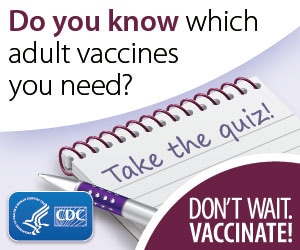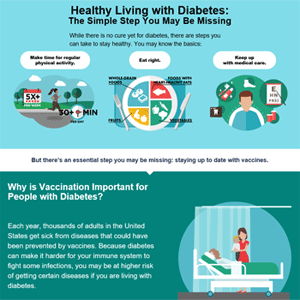
Adults With Chronic Conditions: Get Vaccinated

Each year thousands of adults in the US get sick from diseases that could be prevented by vaccines—some people are hospitalized and some even die. Adults can protect themselves and others from many diseases by getting vaccinated. Recommended vaccines are especially important for adults with chronic conditions, who are more likely to develop complications from infectious diseases. If you have a chronic condition, you will probably need to get vaccinated.
Vaccines are an important step in protecting adults against serious, sometimes deadly, diseases. Even if you were vaccinated at a younger age, the protection from some vaccines can wear off with time. In other cases, the viruses or bacteria that vaccines protect against have evolved, so your resistance is not as strong. Finally, as you get older, you may be at risk for vaccine-preventable diseases because of your age, job, hobbies, travel, or health conditions.
CDC recommends that all adults get the following vaccines:
- Influenza (flu) vaccine every year to protect against seasonal flu.
- Td vaccine every 10 years to protect against tetanus.
- Tdap vaccine once instead of Td vaccine to protect against tetanus and diphtheria plus pertussis (whooping cough) and during each pregnancy for women.
- Other vaccines you need as an adult are determined by factors such as age, lifestyle, job, health condition, and vaccines you have had in the past. Vaccines you need may include those that protect against: shingles, human papillomavirus (which can cause certain cancers), pneumococcal disease, meningococcal disease, hepatitis A and hepatitis B, chickenpox (varicella), measles, mumps, and rubella.
Adults with chronic conditions are more likely to develop complications from vaccine-preventable diseases. Complications can include long-term illness, hospitalization, and even death. Talk to a health care professional to make sure you are up to date on the vaccines CDC recommends for you.

Heart Disease
People with heart disease, or those who have had a stroke, have a higher risk of serious medical complications from flu. Among adults hospitalized with flu during the 2017-2018 flu season, heart disease was among the most commonly reported chronic conditions.
CDC recommends people with heart disease get a yearly flu vaccine. They should also get pneumococcal vaccines—once as an adult before 65 years of age and then two more doses at 65 years or older. To learn more, visit CDC’s page on diabetes and adult vaccination and check out CDC’s animated infographic Healthy Living with Diabetes: The Simple Step You May Be Missing.
Lung Disease
People with asthma, chronic obstructive pulmonary disease (COPD)—or other conditions that affect the lungs—have a higher risk of complication from flu. This is true even if the condition is mild and symptoms are controlled. Since people with asthma have sensitive airways, inflammation caused by flu can trigger asthma attacks. In general, the flu can make asthma and COPD symptoms worse. People with lung disease are more likely to develop pneumonia and other respiratory diseases after getting sick with flu.
CDC recommends people with asthma, COPD, or other conditions that affect the lungs get a yearly flu vaccine. If you have a lung condition, you should also get pneumococcal vaccines—once as an adult before 65 years of age and then two more doses at 65 years or older. Your doctor may recommend additional vaccines based on your lifestyle, travel habits, and other factors. To learn more, visit CDC’s page on lung disease and adult vaccination.

Diabetes
People with type 1 or type 2 diabetes have a higher risk of hepatitis B virus infection. Hepatitis B can spread from the sharing of blood glucose meters, finger stick devices, or other diabetes care equipment. People with diabetes, even if well managed, are more likely to have complications from the flu. They are at increased risk for pneumonia, which can lead to hospitalization. Having an infection can also make it more difficult to control your blood sugar so it is important to monitor blood sugar more often when sick.
CDC recommends people with diabetes get pneumococcal vaccines (once as an adult before 65 years of age and then two more doses at 65 years or older), a yearly flu vaccine, and a hepatitis B vaccine series (for those between the ages of 19 and 59). If you are 60 years or older, talk to a health care professional to see if you should get hepatitis B vaccine. To learn more, visit CDC’s page on diabetes and adult vaccination and check out CDC’s animated infographic Healthy Living with Diabetes: The Simple Step You May Be Missing.
Vaccines are the safest way to protect your health. Talk with your doctor about getting your vaccinations up to date.
































No hay comentarios:
Publicar un comentario